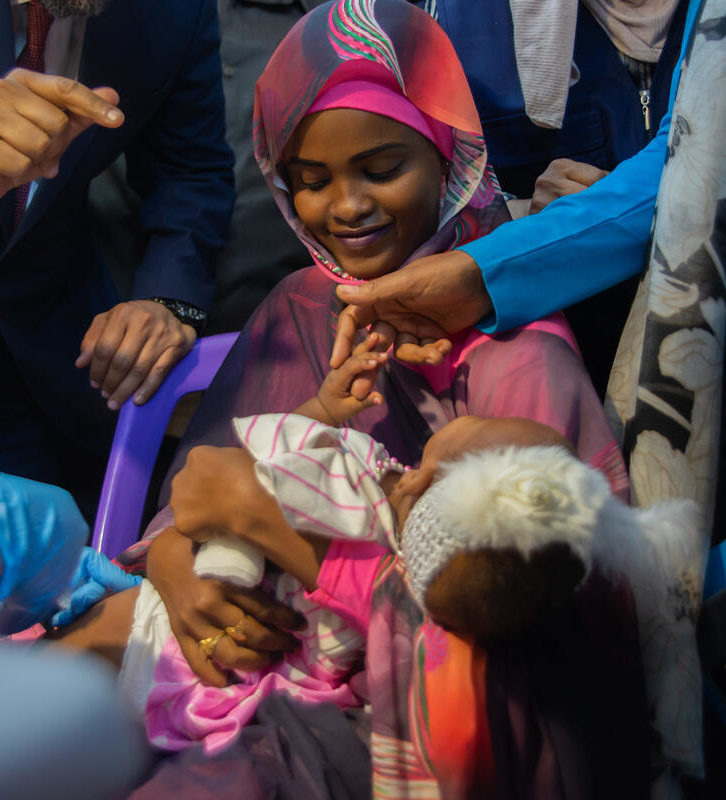Your support will help save millions of lives and fuel hope.

Support the most vulnerable
Every humanitarian crisis is a health crisis. In an emergency, people are at increased risk of death, severe injury, trauma and disease outbreaks; rapid access to health-care services can be the difference between life and death.
Your support today means the WHO can increase the number of vaccines delivered to priority countries; provide access to lifesaving supplies, health services to millions of women and children in humanitarian settings, support WHO in educating and employing millions of health workers; and help countries or eliminate malaria, mother-to-child HIV transmission and other diseases.
In the heart of crisis, conflict, natural disasters and polarized worldviews, we see stories of resilience and hope. We see people come together to face adversity and divisiveness, through shared values of solidarity and empathy.
Your support empowers the WHO to deliver life-saving aid, bring comfort to the suffering, and rebuild shattered lives.
WHO is staying and delivering in emergencies
WHO’s teams are on the ground in the occupied Palestinian territories, reaching over 350,000 people a week through a network of partner organizations delivering thousands of tonnes health supplies. In Lebanon, where the current escalation of conflict has displaced over 1 million people, most of whom are women, children and elderly, WHO has mobilized supplies for 100,000 people; is coordinating the dispatch of emergency medical teams; and is training surgeons to treat trauma-related injuries.
In Sudan where the humanitarian situation remains critical, WHO emergency health supplies for 3.5 million people, including life-saving nutritional aid for those suffering the complications of severe malnutrition. In the absence of functioning health services, WHO’s vaccine drives are protecting millions of children against measles, rubella and cholera.
Since the mpox disease outbreak on the African continent has been declared a public health emergency of international concern, the WHO has issued an emergency approval for the first ever vaccine against the disease in September. Since then more than 19,000 people have been vaccinated in the Democratic Republic of Congo (DRC) alone. Through expert guidance, training, and access to diagnostics, WHO’s emergency coordination units are working tirelessly to help countries to contain the outbreaks and to prevent further global spread of the disease.
Your support today means that the critically ill can get treatment and access to lifesaving supplies.
Take Action Today.

Support WHO’s work in Emergencies
Help the people of Sudan
The war that has been raging in Sudan for over eight months has had a devastating impact on the lives, livelihoods, and health of millions of people. A health system already struggling due to structural weaknesses, violence, disease outbreaks, and hunger is now buckling under the enormous pressure caused by the war and the huge population displacements it has caused.
The health of 14.7 million people hangs in the balance in the face of mass displacement, injuries, hunger and floods. Sudan is also facing outbreaks of measles, malaria, dengue fever, cholera, and other water- and vector-borne and vaccine preventable diseases, compounded by the health risks associated with seasonal rains, poor water quality, poor hygiene and waste management.
More than 3.1 million people are estimated to be at risk of cholera in Sudan between July and December 2023. About 70% of hospitals in conflict-affected states are non-functional, while functioning hospitals and clinics in more stable states are overwhelmed.
WHO is targeting 14.7 million people for health assistance distributing emergency medical supplies, including Interagency Emergency Health Kits (IEHKs), trauma kits, cholera kits, non-communicable disease kits, and kits for the management of severe acute malnutrition in priority areas of the country. With your support the WHO can continue to improve shelter conditions, nutrition, and water, sanitation, and hygiene (WASH) practices. The WHO can continue to support treatment centres and invest in diagnostic testing, vaccination campaigns, mass drug administration, and vector control measures to fight disease outbreaks.
Take Action. Stand with humanity today.

“With your support, we will save lives, meet critical health needs for the most vulnerable, and help communities emerge from crisis with a greater ability to tackle future health threats.”
– Dr Tedros Adhanom Ghebreyesus,
Director-General of the WHO
